
Catalog excerpts
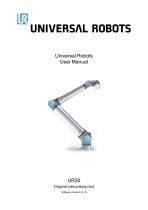
Universal Robots User Manual UR20 Original instructions (en) Software Version: 5.16
Open the catalog to page 1
User Manual Copyright © 2009–2024 by Universal Robots A/S. All rights reserved.
Open the catalog to page 2
The information contained herein is the property of Universal Robots A/S and shall not be reproduced in whole or in part without prior written approval of Universal Robots A/S. The information herein is subject to change without notice and should not be construed as a commitment by Universal Robots A/S. This document is periodically reviewed and revised. Universal Robots A/S assumes no responsibility for any errors or omissions in this document. Copyright © 2009–2024 by Universal Robots A/S. Copyright © 2009–2024 by Universal Robots A/S. All rights reserved. The Universal Robots logo is a...
Open the catalog to page 3
User Manual Copyright © 2009–2024 by Universal Robots A/S. All rights reserved.
Open the catalog to page 4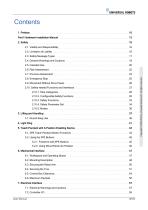
Part I Hardware Installation Manual 2.3. Safety Message Types 2.4. General Warnings and Cautions 2.9. Movement Without Drive Power 2.10. Safety-related Functions and Interfaces 2.10.2. Configurable Safety Functions 3. Lifting and Handling 3.1. Round Sling Use 5. Teach Pendant with 3-Position Enabling Device 5.1. 3PE Teach Pendant Button Functions 5.2.1. Freedrive with 3PE Buttons 5.2.2. Using Move Robot into Position 6.1. Workspace and Operating Space 7.1. Electrical Warnings and Cautions User Manual Copyright © 2009–2024 by Universal Robots A/S. All rights reserved.
Open the catalog to page 5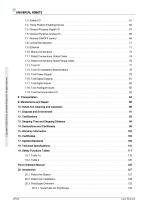
Copyright © 2009–2024 by Universal Robots A/S. All rights reserved. 7.4. Three Position Enabling Device 7.5. General Purpose Digital I/O 7.6. General Purpose Analog I/O 7.7. Remote ON/OFF control 7.11. Robot Connections: Robot Cable 7.12. Robot Connections: Base Flange Cable 7.14. Tool I/O Installation Specifications 7.15. Tool Power Supply 7.16. Tool Digital Outputs 7.17. Tool Digital Inputs 7.18. Tool Analogue Inputs 10. Robot Arm Cleaning and Inspection 13. Stopping Time and Stopping Distance 19. Safety Functions Tables Part II Software Manual User Manual
Open the catalog to page 6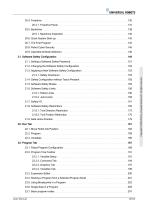
20.4.1. Freedrive Panel 20.5. Backdrive 20.5.1. Backdrive Inspection 20.6. Quick System Start-up 20.8. Robot Cyber Security 20.9. Operational Mode Selection 21. Software Safety Configuration 21.1. Setting a Software Safety Password 21.2. Changing the Software Safety Configuration 21.3. Applying a New Software Safety Configuration 21.4. Safety Configuration without Teach Pendant 21.5. Software Safety Modes 21.6. Software Safety Limits 21.8. Software Safety Restrictions 21.8.1. Tool Direction Restriction 21.8.2. Tool Position Restriction 21.9. Safe Home Position 22. Run Tab 22.1. Move Robot...
Open the catalog to page 7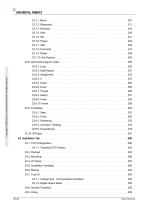
Copyright © 2009–2024 by Universal Robots A/S. All rights reserved. 23.8. Advanced program nodes 23.8.1. Loop 23.10. URCaps 24. Installation Tab 24.1. TCP Configuration 24.1.1. Teaching TCP Position 24.7.1. Analog Input - Communication Interface 24.7.2. Digital Output Mode
Open the catalog to page 8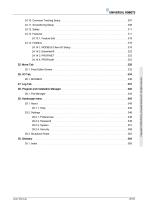
24.10. Conveyor Tracking Setup 24.13.1. Feature Edit 24.14. Fieldbus 24.14.1. MODBUS Client I/O Setup 25. Move Tab 25.1. Pose Editor Screen 28. Program and Installation Manager 28.1. File Manager 29. Hamburger menu 29.1. About 29.1.1. Help 29.2. Settings User Manual Copyright © 2009–2024 by Universal Robots A/S. All rights reserved.
Open the catalog to page 9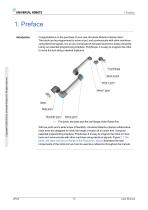
Copyright © 2009–2024 by Universal Robots A/S. All rights reserved. Congratulations on the purchase of your new Universal Robots e-Series robot. The robot can be programmed to move a tool, and communicate with other machines using electrical signals. It is an arm composed of extruded aluminium tubes and joints. Using our patented programming interface, PolyScope, it is easy to program the robot to move the tool along a desired trajectory. 2.1: The joints, the base and the tool flange of the Robot Arm. With six joints and a wide scope of flexibility, Universal Robots e-Series collaborative...
Open the catalog to page 10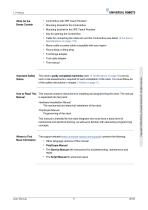
1. Preface What Do the Boxes Contain • Control Box with 3PE Teach Pendant • Mounting bracket for the Control Box • Mounting bracket for the 3PE Teach Pendant • Key for opening the Control Box • Cable for connecting the robot arm and the Control Box (see detail 18 Technical Specifications on page 110) • Mains cable or power cable compatible with your region • Round sling or lifting sling • Tool flange adapter • Tool cable adapter Important Safety Notice The robot is partly completed machinery (see 12 Certifications on page 92) and as such a risk assessment is required for each installation...
Open the catalog to page 11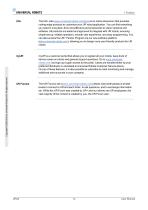
Copyright © 2009–2024 by Universal Robots A/S. All rights reserved. The UR+ site (www.universal-robots.com/plus) is an online showroom that provides cutting-edge products to customize your UR robot application. You can find everything you need in one place—from end-effectors and accessories to vision cameras and software. All products are tested and approved to integrate with UR robots, ensuring simple set-up, reliable operation, smooth user experience, and easy programming. You can also access the UR+ Partner Program via our new software platform (plus.universal-robots.com), allowing you...
Open the catalog to page 12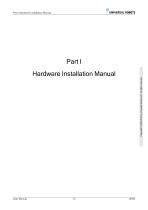
Part I Hardware Installation Manual User Manual Copyright © 2009–2024 by Universal Robots A/S. All rights reserved. Hardware Installation Manual
Open the catalog to page 13
Copyright © 2009–2024 by Universal Robots A/S. All rights reserved. Part I Hardware Installation Manual User Manual
Open the catalog to page 14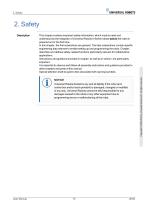
2. Safety This chapter contains important safety information, which must be read and understood by the integrator of Universal Robots e-Series robots before the robot is powered on for the first time. In this chapter, the first subsections are general. The later subsections contain specific engineering data relevant to enable setting up and programming the robot. Chapter describes and defines safety-related functions particularly relevant for collaborative applications. Instructions and guidance provided in chapter as well as in section are particularly important. It is essential to observe...
Open the catalog to page 15




